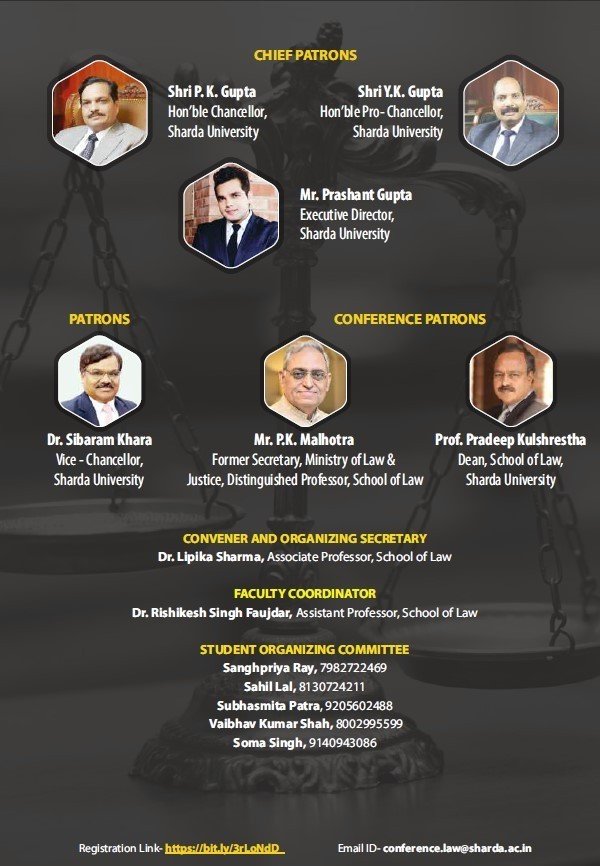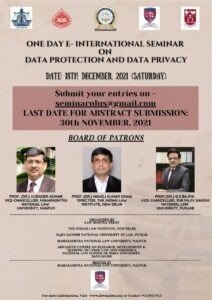International Conference on Environmental Law on “Negative Emissions and Climate Change
About School Of Law Sharda University
Sharda University, established through an act passed by the U. P. legislature (14 of 2009) and permitted by the University Grants Commission to award degrees under Section 22 of the UGC Act 1956, is a leading educational institution based in Greater Noida, Delhi NCR. A venture of the renowned SGI group, the University has established itself as a high-quality education provider with a prime focus on holistic learning and imbibing competitive abilities in students. The University is approved by UGC & prides itself in being the only multi-disciplinary campus in the NCR, spread over 63 acres & equipped with world-class facilities.
The School of law, permitted by Bar council of India letter no. BI: D: 815/2012 (LE mtg 3rd March 2012) has been established as a constituent of Sharda University, a private University, The Bar Council of India after inspection of the academic and physical infrastructure has permitted Sharda University for running 5 Year integrated B.A. LL.B. (Hons.), BBA LL.B. (Hons.), LL.M. & Ph.D. programmes. School of law aims at equipping its law students not only with the traditional professional expertise to become successful advocates and solicitors but for wide-ranging career options viz. business partnerships, managerial assignments, politics, diplomacy, social work, consultancy assignments, teaching, and research work through its wide-based curriculum with an aim to develop intellectual competence and analytical skills coupled with an ethical sense of role and purpose.
The Centre of Excellence for Environmental Law, Research, and Advocacy is pleased to conduct International Conference on Environmental Law. Environmental Law is one of the cores and crucial areas in which endeavors relating to research and education have been stressed upon by the School of Law, Sharda University, Greater Noida, Uttar Pradesh. The Centre of Excellence for Environmental Law aims to continue its efforts in promoting legal and policy research in the field of Environmental Law by conducting conferences, Seminars, workshops and FDP, etc.
About The Conference
In the present era, any discussion on the environment is incomplete without discussing the contribution of the Paris Agreement 2015. The Paris agreement’s focus was on its goal to limit global warming to well below 2 degrees, preferably to 1.5 degrees Celsius, compared to pre-industrial levels. It is important to note that though it is touted as a legally binding agreement, in fact, it is legal which is a hybrid of legally binding and nonbinding provisions. Now it needs to be looked into that what is the role of Negative Emissions to adapt and mitigate climate change. Large-scale carbon removal also referred to as negative emissions, has recently gained attention as a key component of climate change mitigation pathways that limit warming to 1.5 or 2°C.
This developing dialogue is intriguing not just for what it says, but also for what it doesn’t say. The negative emissions literature is present now is forward-looking and hypothetical, characterized by the results of scenario assessments and hence mostly focused on future hazards and situations. While this has sparked a lively debate about the feasibility and appropriateness of various mitigation pathways-as well as how and by whom they are built-there has been considerably less attention paid to stocktaking or efforts to learn from real-world carbon removal experiences.
Despite the fact that many of the “technologies” presently being promoted under the name of “zero emissions” are really harmful to the environment-primarily bio-energy with carbon capture and storage (BECCS) with afforestation and reforestation as discussed in IPCC, 2018 have been around for a considerable time. More generally, the enhancement of carbon sinks has been a policy objective and a coveted offsetting strategy at least since the negotiation of the Kyoto Protocol.
The lessons from earlier experiences with carbon removal directly speak to the present possibilities, limitations, barriers, and conditions for negative emissions and should inform current research and policy promises if we are to avoid repeating past mistakes. Self-reflexivity, on the other hand, must extend to the underlying politics of the negative emissions debate. Because of the irreducibly political nature of carbon removal, researchers must question whose interests are served and whose are neglected in the pursuit of negative emissions.
Call For Papers
The organizers of the International Conference call upon the academicians, practitioners and legal professionals, representatives of governmental and non-governmental organizations, research scholars, and students, etc. to send their unpublished research papers on broad themes mentionedbelow: It is also proposed that the selected papers by the Committee will be published in a special volume on the conference in the form of an edited book with ISBN No. Authors of selected papers would be given an opportunity to present their papers as per the requirement of the theme during sessions on the day of the conference.
Sub Themes
- Carbon sinks and climate change.
- Paris commitment and limiting global warming to 1.5°C : Negative emission technologies
- Biological Techniques of Carbon Dioxide Removal (CDR).
- Direct Air Capture with Carbon Storage
- Bio-Energy with Carbon Capture and Storage, “BECCS”
- Technological and geochemical processes for carbon dioxide capture
- Soil-based negative emissions, such as reforestation, soil management, and the restoration of coastal wetlands.
- Digital carbon footprints
- Climate Neutrality
Guidelines For Abstracts
Abstracts should be without bullet points in paragraph form and should not exceed 350 words. In addition, information regarding the context, intent, processes, findings, and conclusions should be included in the abstract. Co-authorship of up to 2 authors is allowed.
All abstracts must be submitted by 31st August 2021. Abstracts will be reviewed by an organizing committee of scholars. Based on the academic exactitude, significance to the conference theme, and innovativeness of the content, abstracts will be selected. Authors of accepted abstracts are invited to submit, full paper of not more than 5000 words.
Important Dates
Registration & Submission
Abstract Submission (on email: conference.law@sharda.ac.in ) Monday, 20th September 2021
Intimation Of Selection
- Submission of Full paper with Fee: 20 October, 2021
Registration Link- https://docs.google.com/forms/d/e/1FAIpqLSfDHTW91WJotqKgZWrGZC-OR8pJoLs7BrrNGLDuo5lvoQ/viewform
| Registration Fee | |
| For Students – Rs. 750/- (for single-author with co-author Rs. 1000/- if any) Research Scholars: Rs. 1000/- ( for single-author with co-author Rs.1250/- if any ) Academicians, Practitioners/Representatives of Governmental and non-governmental organizations: Rs. 1500/- per participant (Additionally Rs. 500/- for the co-author, if any) | |
| International Submissions– USD 20 | |
| Participation Fee for those who are not presenting papers: Rs. 500/- Email: conference.law@sharda.ac.in E-certificates will be provided to participants. A presentation Certificate will be provided to Paper Presentersonly. |
Mode Of Payment & Bank Details
Account Holder Name: Sharda University-Seminar
Bank Name: ICICI Bank Ltd.
Branch Name: Krishna Apra Royal Plaza, D-2, E(acb), Alpha-1, Greater Noida, Gautam Budh Nagar, UP- 201306
Account No.: 025405005815
Branch Code: 000624
IFSC Code: ICIC0000254
MICR Code: 110229037
SWIFT Code: ICICINBBCTS
Brochure

Previous Posts
One Day E- International Seminar On Data Protection And Data Privacy
Call for Papers for Volume 2, Indian Journal of Legal Review (IJLR)
1st National Drafting Competition by Forum Legitimum: Register by October 10




